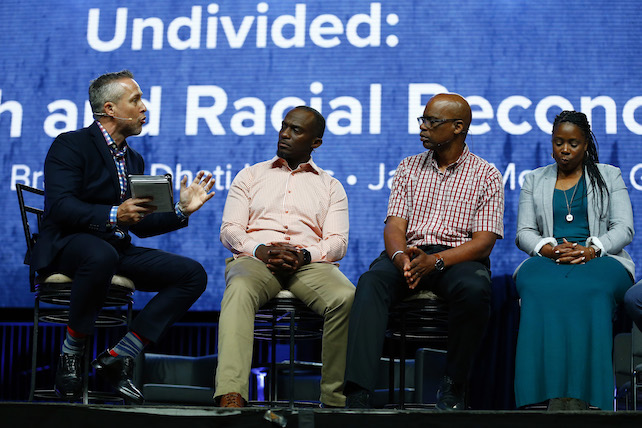(RNS) — New Orleans pastor Fred Luter, the only Black person to have served as president of the predominantly white Southern Baptist Convention, has added his name to a statement on justice and repentance released Friday (Dec. 18).
The “ Justice, Repentance, and the SBC ” statement comes as Black Baptists and others continue to object to the rejection of “critical race theory,” a set of ideas about systemic racism, by the six white SBC seminary presidents.
Luter joined more than 230 other signers of the statement, which was issued on the 155th anniversary of the proclamation of the 13th Amendment, which officially abolished slavery in the U.S. It had more than 230 signatures by noon Eastern on Saturday.
Initially issued by 20 Black and white SBC leaders, the statement said the SBC, having “injustice towards African slaves at its very core,” cannot ignore its history on race. It urged “collective repentance” for the mistreatment of people of color and the “systemic injustice” in SBC churches.
The statement said the SBC had made progress in becoming more inclusive, but “some recent events have left many brothers and sisters of color feeling betrayed and wondering if the SBC is committed to racial reconciliation.”
It said, “Some in the SBC appear to be more concerned with political maneuvering” than racial diversity and suggested the SBC had been “co-opted by outside political forces.” Those who have spoken out about systemic racism, it noted, “are labeled as ‘Marxists,’ ‘Liberals,’ and ‘Critical Race Theorists,’ even though they are theologically orthodox and believe in the total sufficiency of Scripture.”
Some of the signatories previously signed an October commitment by leaders in Deep South cities to “work for justice to right past wrongs.”
Since the seminary presidents released a statement Nov. 30 that declared critical race theory to be incompatible with the denomination’s faith statement, several prominent Black leaders and their churches have criticized their position, with some moving to break ties with the SBC.
On Dec. 11, the Rev. Marshal L. Ausberry Sr., president of the National African American Fellowship of the SBC and the denomination’s first vice president, asked for a meeting with seminary presidents. Five days later, the Rev. Ralph D. West announced he was withdrawing his Houston megachurch’s affiliation with the nation’s largest Protestant denomination. On Friday (Dec. 18), Pastor Charlie Dates said his Chicago church was leaving, calling the seminary leaders’ action “a final straw.”
Also on Friday, the denomination announced SBC Executive Committee President Ronnie Floyd has set an early January meeting with officers of the African American fellowship, the Council of Seminary Presidents of the SBC and SBC President J.D. Greear, who has affirmed the seminary leaders’ statement against critical race theory.
“Southern Baptists have acknowledged and spoken very clearly about the roots of our convention and against the sinful rot of racism that has no place, no welcome, and no future in the SBC, biblical Christianity, or the Kingdom of God,” said Floyd.
Floyd cited the denomination’s 1995 resolution apologizing to African Americans for “condoning and/or perpetuating individual and systemic racism in our lifetime” and its 2000 faith statement that notes: “In the Spirit of Christ, Christians should oppose racism.” But he added, “now it is time for us to focus on our actions” and relations.
“Without relationships and conversations, we will not understand each other,” Floyd said. “Until we repent and change the way we are looking at one another, talking to one another, and treating one another, spiritual revival and awakening will not come.”
Greear also commented Friday on the continuing debate, calling on Baptists to “carefully and soberly” consider the “Justice, Repentance, and the SBC” statement. He reiterated in his blog his stance on critical race theory while also discouraging name-calling in the midst of vigorous debate.
“We recognize that though worldly philosophies like Critical Race Theory arise from worldviews in direct conflict with our own, there are often things we can learn from questions raised and observations made,” he wrote. “We must not default to labeling believers who parse certain questions differently ‘Marxist’ or ‘racist.’ This uncharitable spirit is not only intellectually lazy, it is a sin against the body of Christ.”
Though the signatories of the “Justice, Repentance, and the SBC” document signed their statement “With Hope,” they also appeared to issue a warning:
“Future cooperation remains possible and preferred if we commit to biblical justice and repentance in the SBC,” they wrote. “However, if these commitments are not upheld, then it will signal to many in the SBC that cooperation has already ceased to exist.”
This article originally appeared on ReligionNews.com.

